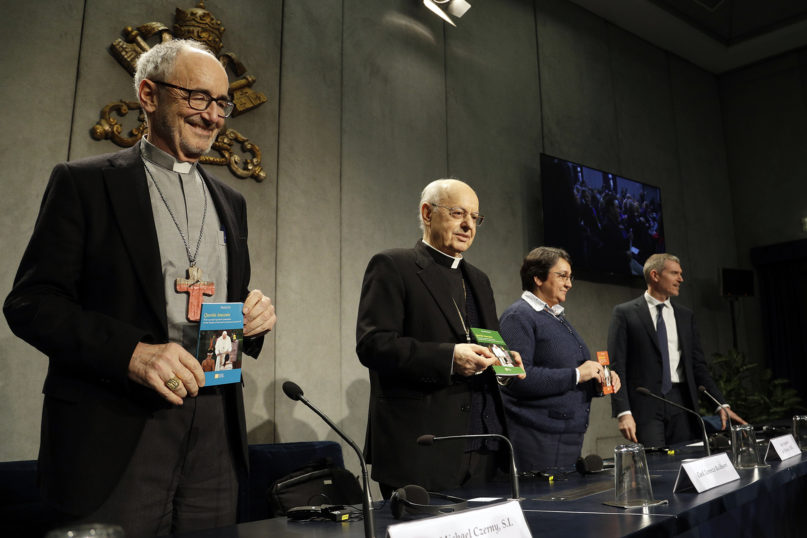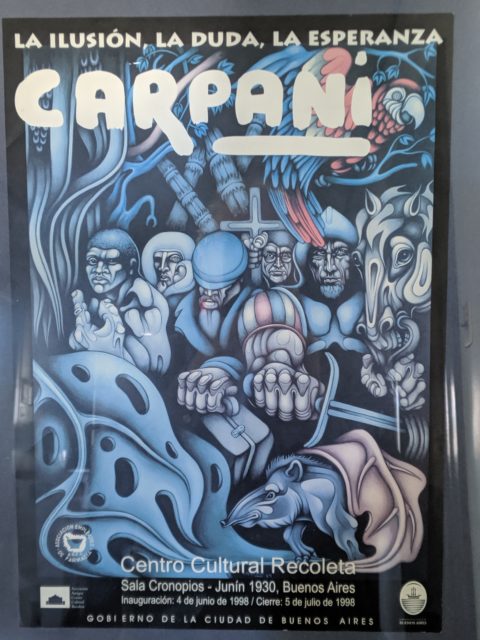(RNS) — On a wall in my office kitchen hangs the poster for an exhibition of works by radical Argentine artist Ricardo Carpani that I bought in Buenos Aires 22 years ago. It reproduces one of Carpani’s “Porteños en la jungla” paintings, portraying hard-faced Buenos Airean men (porteños) pushing their way through the jungle with conquistador arms, a cross and a businessman’s briefcase.
The message has to do with the depredation of the natural world of South America by European capitalism, backed by the Catholic Church. That pretty well captures the way Argentina has treated the continent to which it ambivalently belongs.
Pope Francis, born in Buenos Aires in 1936, is a different kind of porteño. For him the jungle is a place of beauty and wonder, an expression of the richness of God’s creation, cultural as well as natural.
Nowhere is this vision clearer than in “Querida Amazonia,” the apostolic exhortation he issued a month ago to set his seal on October’s Synod of Bishops for the Pan-Amazon region. “Querida” is Spanish for a female romantic partner or a married man’s other woman, and it’s more than tempting to imagine the pope, husband of the universal church, using the exhortation to signal his special relationship with “Mistress Amazon.”
“Popular poets,” he wrote in his exhortation, “enamored of its immense beauty, have tried to express the feelings this river evokes and the life that it bestows as it passes amid a dance of dolphins, anacondas, trees and canoes. Yet they also lament the dangers that menace it.”
Those dangers come above all from economic exploitation. “The powerful are never satisfied with the profits they make, and the resources of economic power greatly increase as a result of scientific and technological advances,” Francis declares. Quoting from his 2015 climate change encyclical, “Laudato Si’,” he calls for “a legal framework which can set clear boundaries and ensure the protection of ecosystems … otherwise, the new power structures based on the techno-economic paradigm may overwhelm not only our politics, but also freedom and justice.”

Cardinal Michael Czerny, from left, Cardinal Lorenzo Baldisseri and Sister Augusta de Oliveira hold copies of the post-synodal apostolic exhortation “Querida Amazonia” written by Pope Francis, during a news conference at the Vatican on Feb. 12, 2020. (AP Photo/Gregorio Borgia)
This critique of capitalism has deep roots in Roman Catholic tradition. St. Francis of Assisi, the papal namesake, turned his back on his prosperous merchant family to follow Christ through a life of poverty and an embrace of all creatures. Modern Catholic social teaching derives from Pope Leo XIII’s 1891 encyclical “Rerum Novarum,” which deploys a somewhat idealized medievalism to assail the exploitative capitalism of his day.
But if “Querida Amazonia” does not hesitate to defend the region’s natural and cultural richness from the capitalism of our day, it is less bold in dealing with ecclesiastical issues. Where a large majority of the region’s bishops called for enhancing the ministerial status of women and, in the face of the most severe priest shortage on earth, the ordination of married men to the priesthood, Francis delivers dusty traditionalism on women’s special role in the church and responds only in the most oblique terms to the call for married priests.
Admitting women to holy orders, writes the pope, “would lead us to clericalize women, diminish the great value of what they have already accomplished, and subtly make their indispensable contribution less effective.”
If, for Francis, there is any threat to his church comparable to capitalism’s threat to the planet, it is clericalism. But to many Catholics, the surest way to de-clericalize Catholicism would be to knock down the gender barrier to ordination and, as the Eastern Orthodox do, open the priesthood fully to marriage.
“It often happens that in particular places pastoral workers envisage very different solutions to the problems they face, and consequently propose apparently opposed forms of ecclesial organization,” Francis writes, seemingly referring to the church’s deep division over ordaining married men. In such cases, “it is probable that the real response … lies in transcending the two approaches and finding other, better ways, perhaps not yet even imagined.”
When it comes to the depredation of Mistress Amazon, Francis knows how to respond. In his relationship with the church, sometimes not so much.






